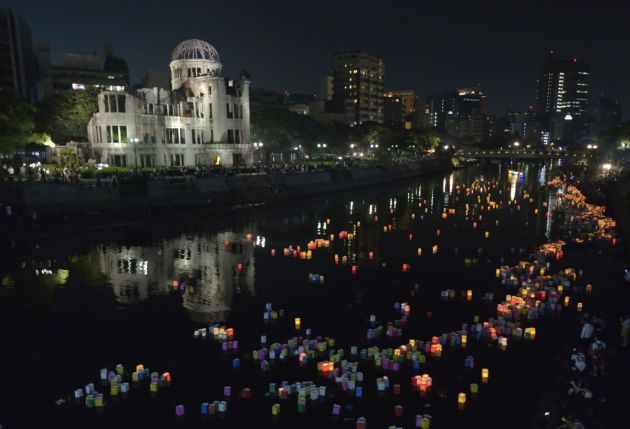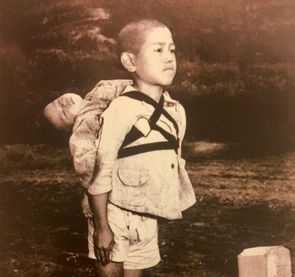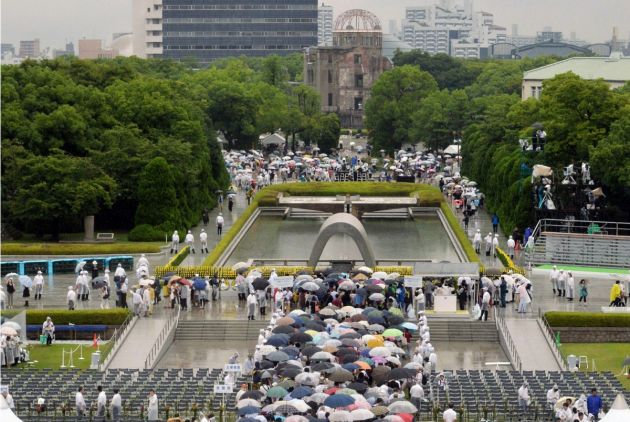75 years after A-bombings in Japan, world worries about new arms race

Hiroshima pastor Yoshitaka Tsukishita was a two-year-old boy playing outside, near what became ground zero, when the world's first atomic bomb was dropped in an act of war on the Japanese city of Hiroshima 75-years ago on August 6.
Rev. Tsukishita is a pastor at Hiroshima Tobu Church of the United Church of Christ in Japan and leads the Hiroshima Christ Church Convention, a grouping of Protestant churches.
He will give a message for peace including testimony of his own experience when he speaks in front of the Atomic Bomb Memorial Tower at the Hiroshima Peace Memorial Park on August 6 along with churches and their leaders worldwide.
"On August 6, 1945, I was two years and eight months old and playing outside my evacuation home that was four kilometers away from the ground zero with my brother who was two years older than I.
"And then, I was blown off by a strong blast," he writes in a pamphlet for the peace gathering.
Japan surrendered after the nuclear bombings that are believed to have led to the deaths of around 150,000 in Hiroshima and 75,000 in Nagasaki, but were preceded by fire-bombings of all Japanese main cities beforehand.
By 1950, an estimated 340,000 people had died because of the bombs' effects, including from illnesses caused by exposure to ionizing radiation said the International Committee of the Red Cross.
"The ICRC and the Japanese Red Cross Society witnessed the unimaginable suffering and devastation, as medical and humanitarian personnel attempted, in near-impossible conditions, to assist the dying and injured," said the ICRC on July 31.
Japan's surrender brought an end to World War II but was followed by a nuclear arms race through the Cold War in the second part of the 20th century and there are fears that race has mutated into another form.
'SIN AGAINST GOD'
The World Council of Churches has since its first assembly in 1948 declared that war with atomic weapons is a "sin against God and a degradation of man."
The WCC has continued to call for the complete elimination of nuclear weapons.
During July and in August, the WCC is publishing blog posts highlighting different reflections of those calling for an end to nuclear weapons, from Japan, the Pacific, from nuclear weapons states and those advocating at the global level.
Jennifer Philpot-Nissen works for the World Council of Churches as a program executive for human rights on the Commission of the Churches on International Affairs and wrote the first blog.
"Despite commitments made over the years, several States have continued to maintain and develop their nuclear arsenals, while other States have worked to acquire them. The U.S. alone spent $35.4 billion on nuclear weapons last year," wrote Philpot-Nissen.
She said the impacts of the current global health crisis provide indications of how life would be following a nuclear attack.
FROM NUCLEAR EXPLOSION AND COVID-19 ALL SUFFER
"Like the COVID-19 pandemic, our health, environment and economies would all suffer, regardless of how far we lived from the site of a nuclear explosion.
"Nuclear tests have shown how radiation spreads into the atmosphere, oceans, plants and animals, and into whole populations."
A U.S. B-29 bomber called the Enola Gay dropped the uranium bomb, code-named Little Boy, exploding around 600 meters (1,800ft) above the industrial city, at around 08:10 on August 6, 1945.
Three days later another industrial city, Nagasaki was bombed with a nuclear weapon.
The atomic bomb that fell on Nagasaki on August 9, 1945 detonated in Urakami only 500 m (1,640 ft) from the St Mary's cathedral completely destroying it and worshipers inside it.
Due to cloud and smoke cover from an earlier fire-bombing raid, the aircraft had missed its primary target of the nearby city of Kokura.
When completed in 1925, until its destruction in 1945, it was the largest Christian structure in the Asia-Pacific region and Nagasaki is the hub of Catholicism in Japan.
US BISHOPS' PRAYERS FOR PEACE
The Catholic bishops of the United States made a call for prayers of peace for Japan ahead of the upcoming anniversary of the detonation of two atomic bombs on Hiroshima and Nagasaki in 1945, Vatican News reported July 14.
"August 6 and 9 mark the 75th anniversary of the bombings of Hiroshima and Nagasaki, the first, and one hopes the last, times that atomic weapons are employed in war," said the bishops in a statement issued by the U.S. Conference of Catholic Bishops' Committee for International Justice and Peace.
"The 21st century continues to witness geopolitical conflicts with state and non-state actors, increasingly sophisticated weapons, and the erosion of international arms control frameworks. The bishops of the United States steadfastly renew the urgent call to make progress on the disarmament of nuclear weapons."
Archbishop Joseph Mitsuaki Takami of Nagasaki, Japan, told Catholic News Service on July 8 that "Americans need to understand and practice the truth of peace that Christ teaches."
"I have the impression that most Americans believe that arms are necessary to protect oneself, one's families and the nation. The history, however, demonstrates how arms brought about tragedies. I want the Americans to work for peace without the possession and use of weapons," the archbishop said.

He reiterated his long-standing call that the time is long past for the world to abolish nuclear weapons.
Takami, 74, is a survivor of the bombing of Nagasaki, his hometown. He was in his mother's womb when the bomb known by the code-names Fat Man detonated over the city, ultimately claiming between 39,000 and 80,000 lives.
Historians and analysts estimate overall that between 129,000 and 226,000 people, most of them civilians, died in the bombings of Hiroshima and Nagasaki.
The archbishop has been a vocal proponent of nuclear disarmament throughout his 48 years as a priest.
He told CNS he views the collapse of arms control treaties between the U.S. and Russia, plans by both countries to spend billions of dollars to upgrade stockpiles and efforts by other nations to acquire such weapons as troubling.
His concerns are echoed by international Red Cross associations.
"The horror of a nuclear detonation may feel like distant history. But today the risk of nuclear weapons being used again is high. Treaties to reduce nuclear arsenals and risks of proliferation are being abandoned, new types of nuclear weapons are being produced, and serious threats are being made.
'A FRIGHTENING ARMS RACE'
"That's an arms race, and it's frightening. We must push all states to ban nuclear weapons and push nuclear weapons states to negotiate, in good faith, steps towards their elimination," said Peter Maurer, president of the International Committee of the Red Cross.
Francesco Rocca, president of the International Federation of Red Cross and Red Crescent Societies said, "The international community would not be able to help all those in need after a nuclear blast.
"Widespread radiation sickness, a decline in food production, and the tremendous scale of destruction and contamination would make any meaningful humanitarian response insufficient. No nation is prepared to deal with a nuclear confrontation," said Francesco Rocca, president of the International Federation of Red Cross and Red Crescent Societies (IFRC).
